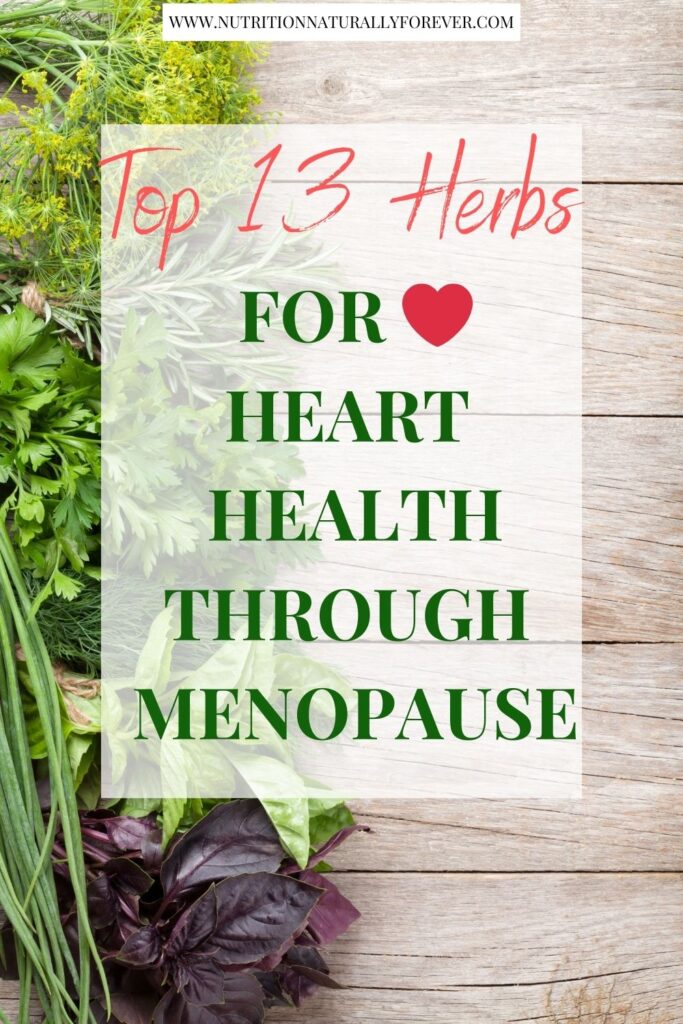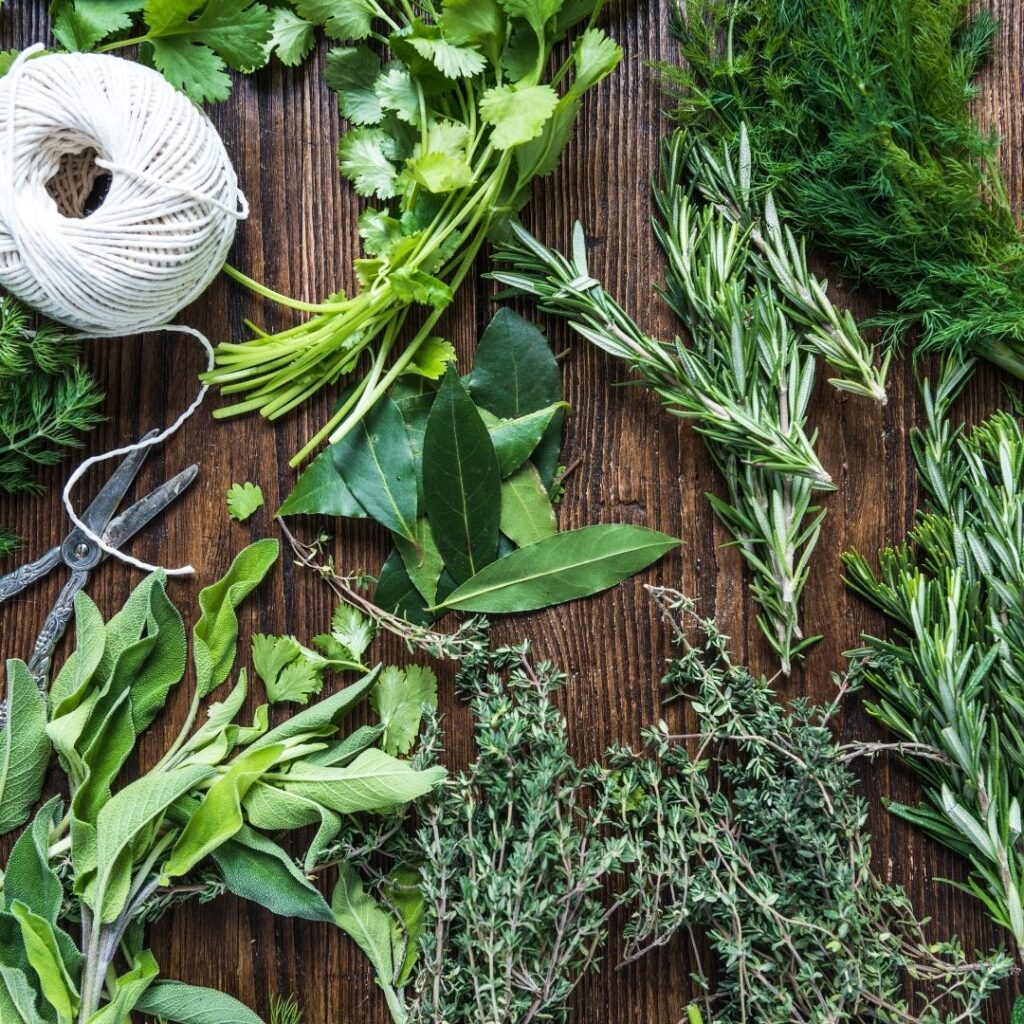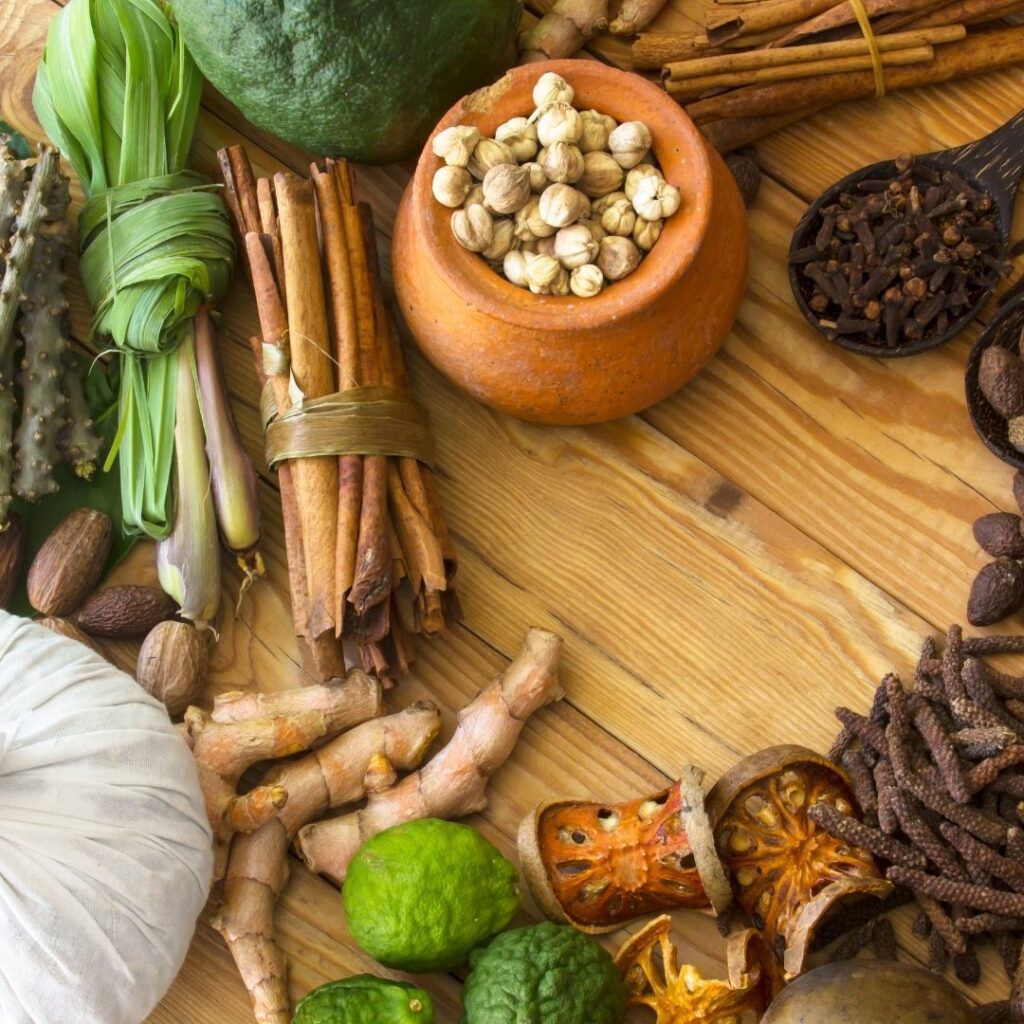
Top 13 Herbs for Heart Health Through Menopause.
The leading cause of death in women is cardiovascular disease (CVD) followed closely by dementia.
You would be right in thinking that heart disease is more traditionally linked to men’s health but as women go through the menopause transition levels of heart-protecting estrogen become erratic before becoming very low.
The risk of heart attack is 5 times higher post-menopause than before.
With this in mind, it is important to understand more about heart disease and how to take natural preventative measures.
Natural remedies and herbal supplements can play a significant role in promoting heart health, along with a healthy diet, as they contain bioactive compounds that can benefit various aspects of health beyond just heart health.
For example, herbs like garlic and turmeric have anti-inflammatory properties that can help reduce inflammation throughout the body, including in the cardiovascular system.
Compared to some pharmaceutical medications, natural remedies and herbal supplements may have fewer side effects, making them a safer option for long-term use, especially when used appropriately and under the guidance of your healthcare provider.
Natural remedies and herbal supplements can complement conventional medical treatments for heart conditions. They may help support the effectiveness of prescribed medications or reduce the dosage needed, potentially minimising the risk of adverse effects.
Some herbal supplements target underlying factors contributing to heart disease, such as high blood pressure, high cholesterol, or inflammation.
By addressing these symptoms, natural remedies can help prevent or manage heart conditions more effectively.
By taking a holistic approach to health and well-being post-menopause with a healthy lifestyle containing well-balanced nutrition, movement and stress management techniques along with getting adequate sleep you can maintain overall health not just your heart.

Understanding Heart Health
So, let’s talk about cardiovascular disease, or what we often just call heart disease. It’s like an umbrella term for a whole host of conditions that mess with your heart and the highways (blood vessels) it uses to pump blood around your body.
First up, we’ve got Coronary Artery Disease (CAD).
Picture this, your coronary arteries are like the delivery trucks bringing oxygen-rich blood to your heart muscle. But sometimes, these arteries get clogged up with a sticky stuff called plaque. It’s like trying to drive a truck through a narrow alley. This plaque buildup can make it harder for blood to get to your heart, which can lead to chest pain (angina), and heart attacks.
Then there’s hypertension or high blood pressure. Think of it as your blood pressure gauge getting stuck in the “too high” zone. Over time, that high pressure can strain on your blood vessels, making them more likely to get damaged. It’s like setting the stage for heart disease, stroke and other complications.
Next, there’s Heart failure. Imagine your heart as a pump that’s not working as well as it should. It’s like trying to inflate a balloon with a tiny hole in it. Your heart just can’t pump enough blood to meet your body’s needs. And that can happen for all sorts of reasons, such as if you’ve had heart problems before or if you’ve got high blood pressure.
Another condition is arrhythmias. Your heart’s got this rhythm, it’s like a drummer keeping the beat for the rest of the band. Sometimes, that rhythm gets all out of sync. Your heart might start racing, skipping beats, or doing its own thing entirely. This is a common symptom during menopause and while some of these rhythm disruptions aren’t a big deal, if you experience them for longer than a minute or so it’s best to get checked.
Let’s not forget about heart valve disorders. These valves open and close to keep blood flowing in the right direction when these valves don’t work like they should they might get stuck or leaky, messing up the flow of blood through your heart. It’s like a leaky tap not being able to shut off.
Last but not least, there’s peripheral artery disease (PAD). This one’s like a traffic jam on the highways that carry blood to your arms and legs. Plaque buildup in these arteries can slow down or even block blood flow, causing all sorts of problems like pain, numbness, and even wounds that won’t heal properly.
Cardiovascular Disease is a big deal which is why it is so important to prioritise heart health naturally within your day-to-day lifestyle so that it doesn’t become an issue. This is where herbs for heart health can support you naturally.
Risk factors for Heart Health
To maintain a healthy heart it is helpful to know the risk factors, you can then adjust your lifestyle if needed to keep your cardiovascular health in tip-top condition.
The following are the most common risk factors of poor heart health in women;
- High Blood Sugar – Over time high blood sugar can damage the blood vessels and nerves that control the heart. You can read more about reducing high blood sugar levels in my previous post HERE.
- Insulin Resistance – Consistent high blood sugar leads to insulin resistance. If insulin can’t do its job of moving glucose to the cells the liver will store the excess glucose as body fat. Increased body fat increases the pressure on the heart.
- Menopause – Estrogen provides a protective effect on the heart, as this declines it increases the risk factor for heart disease, however, there are herbal remedies that may counter this effect.
- Stress – The effect of stress on the body as a whole is extremely damaging. When stressed the body releases cortisol. Cortisol is prioritised over sex hormones i.e. estrogen. Chronic stress leading to consistently elevated levels of cortisol is linked to high blood sugar and high blood pressure.
- Sedentary lifestyle – Leading a sedentary lifestyle stops the optimal flow of blood around the body being cleaned and oxygenated regularly. Blood can become clogged with fat and debris leading to a high risk of blood clots.
One thing you need to know about me and my nutrition practice is that I like to get to the root cause of any symptoms you may be experiencing. Symptoms and discomfort are the way the body communicates disharmony.
All of my clients go through the SHIFT System which focuses on treating the main organs responsible for the optimal functioning of the body.
This will look like reducing inflammation, supporting friendly gut bacteria and reducing the load on the liver and adrenals.
Focusing on these main areas will support not only menopause health but heart health too by balancing blood sugar, reducing inflammation, lowering stress and nourishing the body so that it has the building blocks to supply the hormones, neurotransmitters and enzymes it needs to heal itself.
Herbs for Heart Health
To maintain better heart health, alternative medicine is a great place to start. Herbs for heart health can be powerful but also gentle and are a great way to supplement a balanced diet.
If you want to avoid prescription drugs here are a few medicinal plants to get you started;
- Green Tea
Green tea has many nutrients, compounds, vitamins and minerals. There are clinical studies that show these nutrients are effective at breaking down the plaque that builds up in arteries complicating heart health however, you would need to drink a vast amount of tea for this to be effective. There was one Japanese study of 40,000 participants over 11 years that was linked to a lower risk of cardiovascular disease due to the antioxidants (polyphenols). The minimum quantity recommended was 5 cups per day.
2. Hawthorn Extract
Hawthorn berries are packed with antioxidants making them useful for reducing inflammation in the body, the root cause of all disease! In Traditional Chinese Medicine (TCM) Hawthorn is recommended to treat high blood pressure as it is a vasodilator meaning it can relax constricting blood vessels and therefore reduce blood pressure, this would in turn support heart health.
3. Ginkgo Biloba
Gingko Biloba boasts the ability to increase blood flow to various parts of the body. This increase in blood flow increases the amount of circulating nitric oxide. Nitric Oxide is a compound responsible for dilating blood vessels therefore increasing blood flow to the heart.
4. Cayenne Pepper
The active compound in Cayenne Pepper is Capsaicin. This compound has vasodilatory properties, which means that it helps to keep the blood vessels wide so that the blood can flow with ease ensuring that blood pressure stays at a healthy level supporting heart health.
5. Olive Oil
Olive oil contains plant-based compounds that provide an anti-inflammatory effect on the body in general such as, lower inflammation, improving the lining of blood vessels and preventing excessive blood clotting.
6. Terminalia Arjuna
Terminalia Arjuna contains powerful antioxidants which have been found to protect the heart from oxidative stress. Terminalia Arjuna can increase heart function, protect it from damage and heal it from cardiac injury and trauma.
7. Black pepper & Turmeric
Turmeric has become popular in recent years as more and more people benefit from its anti-inflammatory properties. Coupled with black pepper and its active ingredient piperino it helps the body extract the active compound curcumin from the turmeric increasing antioxidants and reducing free radicals.
8. Allium Sativum (Garlic)
Garlic has a long history of health benefits, supporting the body to fight off and recover quickly from colds and lowering blood pressure and cholesterol.
Could this be down to its vitamin C content?

Vitamin C and Herbs for Heart Health
Numerous scientific research studies over the years have found vitamin C deficiency to be the root cause of heart disease and is known as ‘Local Scurvy’.
Localised Vitamin C deficiency in the coronary arteries can be caused by;
- Everyday toxins
- Pathogens
- Free Radicals
- Acute/chronic infections
High cholesterol and high blood pressure are symptoms of arterial blockages.
Heart disease starts when the innermost protective lining (the intima) of the arteries starts to become unglued, due to localised vitamin C deficiency, allowing the gel-like substance that holds everything together to become loose and watery.
The space this then makes allows plaque to build up which then begins to clog the arteries.
Vitamin C is required to maintain strong and resilient collagen which is required for all structural tissue in the body, not just our faces!
A continuing vitamin C deficiency leads to depleted collagen resulting in an unrestrained build-up of plaque.
For decades we have been warned about the danger of high cholesterol levels and the link to heart disease.
Is this the chicken or the egg though?
Blood cholesterol depletes vitamin C. Vitamin C deficiency increases cholesterol levels.
The build-up of cholesterol-containing plaque is the body’s response to patching up weak arterial walls.
Vitamin C lowers blood pressure, vitamin C is required to maintain optimal collagen which protects the heart – and our features!
Cholesterol is not all bad. One of its functions is to neutralise or inactivate toxins. Therefore we could blame increased exposure to toxins for increased levels of cholesterol.
Best Herbs for Vitamin C
To protect and repair the heart increasing vitamin C in your diet or using a quality supplement is a simple step to take.
The recommended daily allowance of vitamin C for women is 75mg per day, the upper limit is 2000mg.
Why do vitamin C supplements have such high doses?
The reason for this is due to the way the body absorbs this vitamin. It is absorbed in the small intestine and only one molecule can pass through the limited amount of portals which accept vitamin C at a time.
When the portals are busy, unused vitamin C will pass through the body for excretion.
Whether you obtain your vitamin C from food or a supplement it is best to take small doses more frequently to allow the body the best opportunity to absorb what it needs.
Now you know the benefits of vitamin C for heart health, the following are herbs high in vitamin C;
- 9. Rosehips – These are high in flavonoids, the antioxidants have been shown to reduce blood pressure and improve blood flow to the heart. There is approximately 7.5mg of vitamin C in a cup of Rosehip tea.
- 10. Dandelion – Dandelions are an excellent source of minerals which support electrolytes that stimulate heartbeat. Not only that they pack a good vitamin C punch – 19.3mg of vitamin C in a cup of dandelion tea.
- 11. Raspberry Leaf – Often associated with pregnancy and childbirth Raspberry leaves contain antioxidising polyphenols such as tannins, bioflavonoids and alkaloids, these are said to tone and relax uterine muscles, could they do the same for the heart? Red raspberry leaf tea is a good source of vitamins C, E and A.
- 12. Parsley – Not only is Parsley rich in vitamin C it is also high in the B vitamin folate. It is suggested that diets rich in folate reduce the risk of heart disease. 1 tablespoon = 5.1mg of vitamin C.
- 13. Acerola Cherry – Acerola is most well-known for being extremely rich in vitamin C. It’s also used as an antioxidant nutrient. You can buy Acerola Cherry juice to dilute into water. 4.8g of this fruit provides a whopping 80.5mg of vitamin C!
Conclusion
There are so many herbs, including herbs for heart health, available to buy and they are so simple to add to your lifestyle in the form of tea.
If you want to start growing fresh produce at home, herbs are a great place to start.
Whether you choose traditional medicine or herbal treatments, knowledge and understanding of the body and the processes involved in optimal health give you the power to make decisions to support your health in the best ways for your unique lifestyle.
Just remember that there can be drug interactions with herbal remedies and dietary supplements so always speak to your health practitioner to clarify risk.
If you would like to chat with me about your unique menopause transition, book a Wild Well-Being call and come away inspired and motivated to begin your journey to optimal health.
